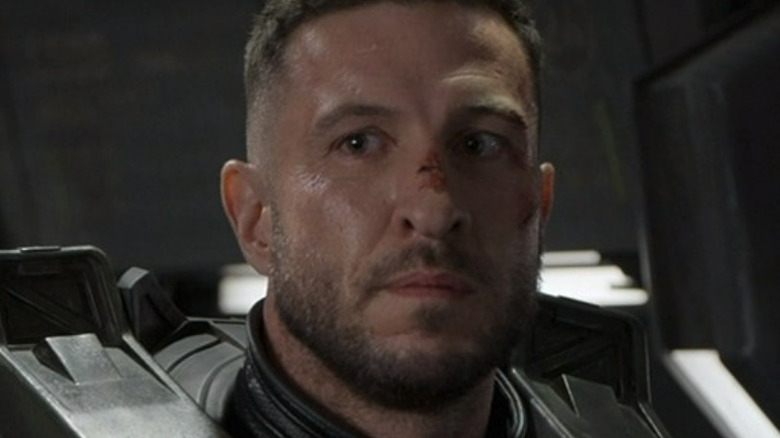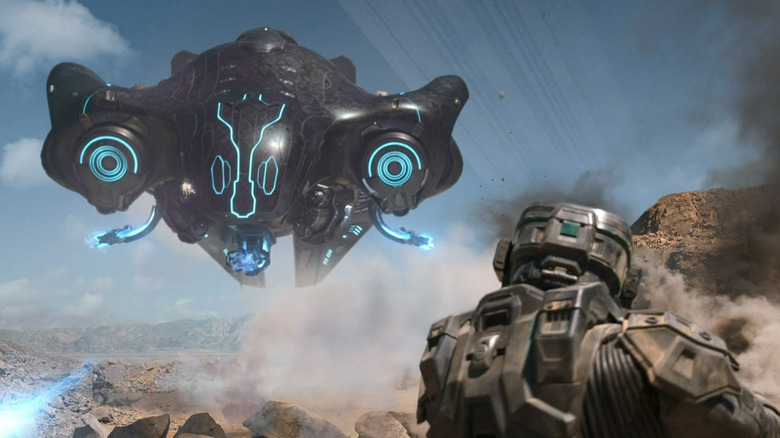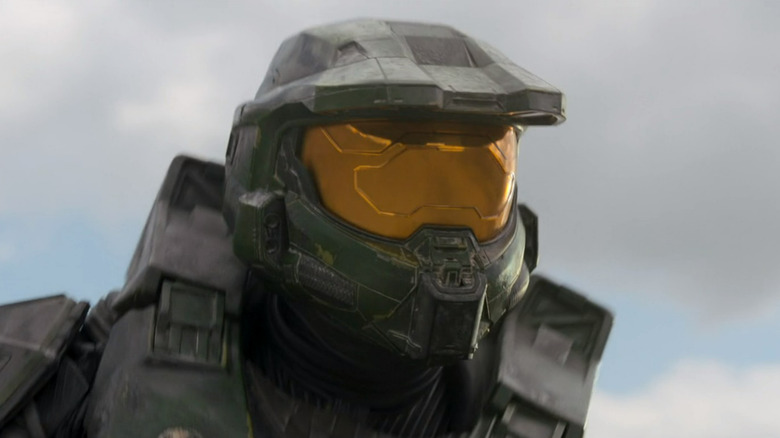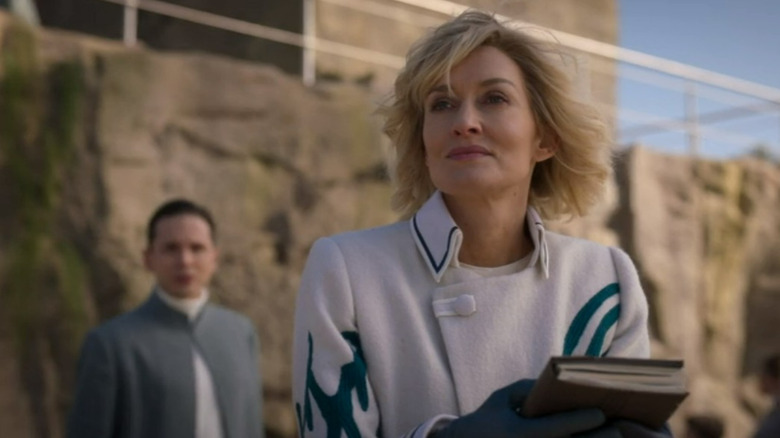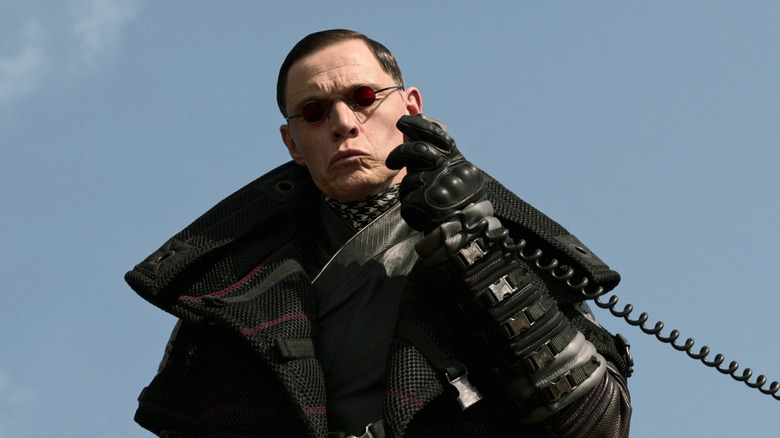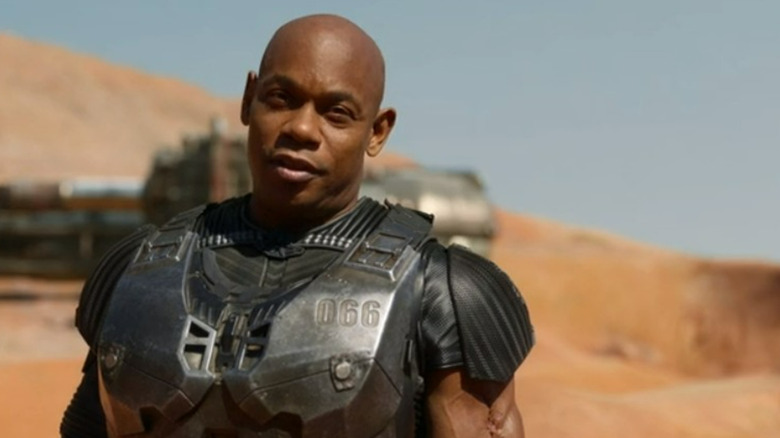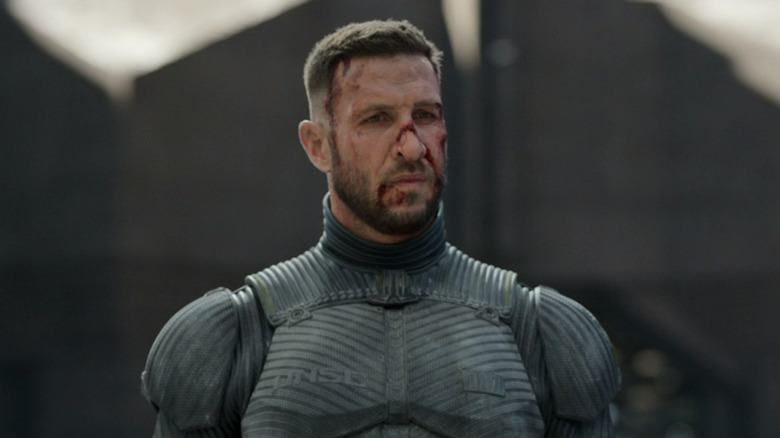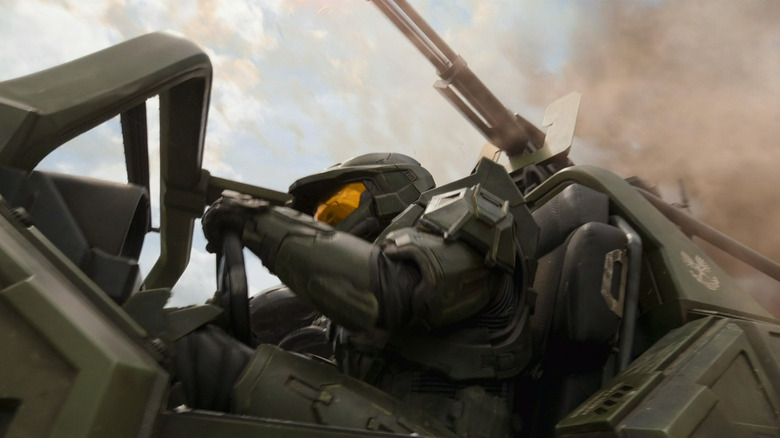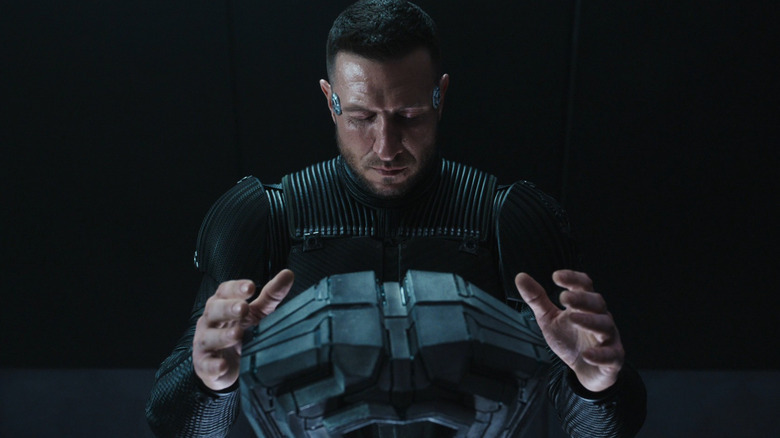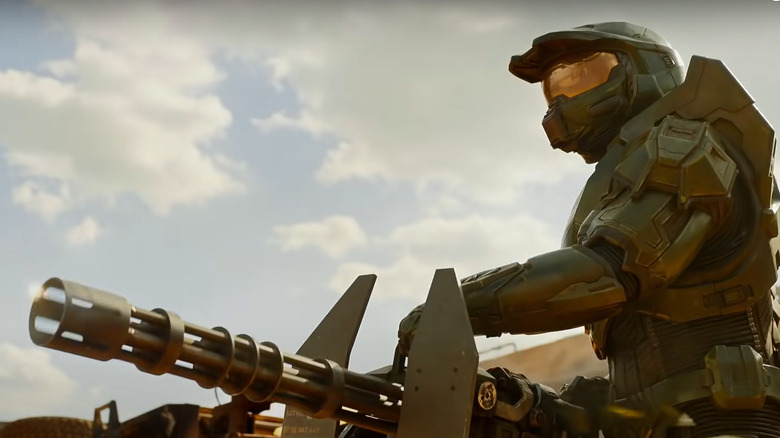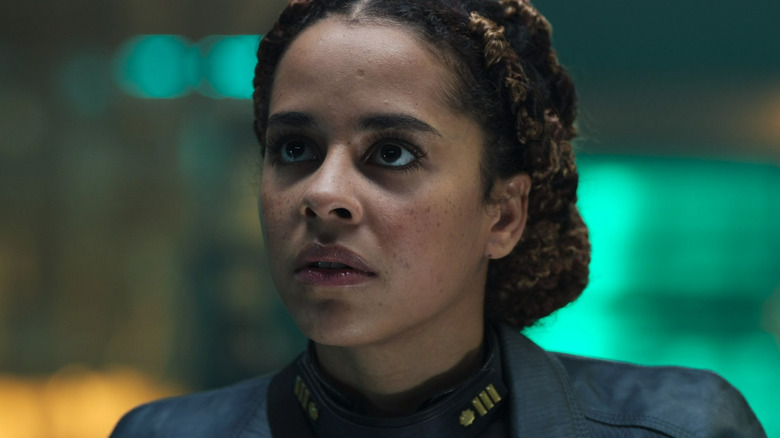The 5 Best And 5 Worst Things In Halo Season 1
As is the case with most movies and TV series based on video games, the "Halo" show was shrouded in skepticism leading up to its premiere on Paramount+. The adaptation was in development for years before manifesting in its final form, which has wound up earning mixed reviews overall. It's a consistently solid show for the most part, and at times it's even a good one, but a number of major problems plague "Halo" from start to finish. By the time the end of Season 1 rolls around, its lasting impression is one of sloppy writing and missed opportunities.
That's not to say that there aren't redeeming qualities sprinkled throughout "Halo" Season 1. There are standout performances from the ensemble cast, a handful of exciting battles, and an attention to detail in the look and feel of the show that successfully captures the atmosphere of the games. The series starts strong, but it repeatedly loses its way as it moves forward, leaving a mess in its wake that will hopefully be tidied up in the already ordered Season 2.
Should you watch "Halo" if you haven't started yet? Should you return for the second season after the lackluster Season 1 finale? The answers to these questions will surely vary from one person to another, largely due to the uneven nature of the show. Here are some of the things that "Halo" Season 1 does well, and as well as some of the biggest mistakes that need to be fixed in the future. Major spoilers ahead.
Best: Picture perfect
In any adaptation, changes are inevitable. You can't bring a story from one medium to another without making some tweaks and adjustments. The key, of course, is to always have a reason for the changes you make. If fans already love the way a particular weapon, vehicle, or planet looks, for instance, it's probably best to just keep it the same.
If the "Halo" series has one supreme triumph, it's that almost every visual aspect of its world is copied perfectly from the games. Every UNSC and Covenant weapon, every Warthog and Banshee, and every piece of Mark VI Mjolnir armor is recreated in expert live-action detail. And because the "Halo" games are designed to give players multiple options in combat, there's a lot of inspiration to pull from. Needlers, plasma grenades, Brute Chieftains, Sangheili Elites — all these and so many more are instantly recognizable, ensuring that the "Halo" show looks the part every step of the way.
This level of accuracy is even true in the show's audio design. Certain sound effects — like the warning alarm that sounds when a Spartan's shields go down or the reassuring "whoop" that plays when they recharge — are pulled directly from the audio files of the games. Energy Swords crackle with electricity, Master Chief pistol-whips enemies with visceral "thwacks," and each Covenant race speaks in recognizable tones and lilts. If nothing else, the show does an excellent job of reminding you that you're in the "Halo" universe.
Worst: Master Chief
You don't have to look far on the internet to find complaints about the "Halo" show's portrayal of Master Chief. Everyone from independent fans to writers at Forbes have taken shots at Pablo Schreiber's performance, how much time he spends without his helmet, his odd penchant for being naked, and of course, the objectively bizarre sex scene he takes part in during Episode 8.
To be fair, the show was already going to have a difficult time bringing its protagonist to the big screen. In the games, Master Chief isn't much of a character. He's barely a person. He's a seven-foot-tall quip machine who does cool stuff and never gets bogged down in the details. That's fine in a video game, but it's far from a great recipe for the main character of a TV show. Essentially, the show's writers had two choices: Make Master Chief a secondary character who stays basically the same as he is in the games, or change him dramatically so that he fits the mold of a live-action protagonist. It's clear that they chose the second option, but the end result is questionable at best.
Schreiber isn't bad in the role, but the material he's given gets increasingly challenging as the first season progresses. Maybe the writers were scared of drawing unfavorable comparisons to "The Mandalorian," but Chief really could have benefitted from a bit more time under the helmet. The problem isn't that he feels emotions, or that he loses his cool, or even that he has sex with a Covenant spy (though, again, that part's very weird) — it's that he spends so much more time being moody out of his armor than he does being capable in it. "Halo" tries to give Master Chief a meaningful arc about self-discovery and the importance of emotional autonomy, but it ends up feeling like a mushy montage of grimaces and sad boy eyes.
Best: Natascha McElhone as Catherine Halsey
On the flip side of Master Chief's disappointing presentation, Natascha McElhone's performance as Dr. Catherine Halsey is a definite highlight of "Halo" Season 1. Though she's more of a background figure in the "Halo" games, Halsey is a hugely important part of the overall franchise lore, mainly because she's the one behind the entire Spartan program.
The "Halo" series does some of its best character writing with Halsey, who reveals herself to be a deeply reprehensible person throughout the first season. On top of the big red flags of eugenics and light fascism (the latter of which the entire UNSC is guilty of), Halsey is a bad mother, a pathological liar, and a self-righteous egotist who built her reputation on the backs of kidnapped children. In a story where the enemy is supposed to be the alien horde knocking down humanity's front door, Halsey somehow comes out feeling like the true villain.
In a lesser actor's hands, the character could have turned out pretty basic and one-dimensional, but McElhone is exceptional in the role. She sells both Halsey's conviction and her manipulative nature convincingly, giving the show a kind of third party to the Human-Covenant War. If there's a downside to Halsey, it's only that the show doesn't quite take enough time to explore the broader ramifications of her actions. Even then, though, it's entertaining enough just to watch McElhone act circles around the majority of the cast.
Worst: Too scattered
The "Halo" series starts on the distant planet of Madrigal, where a sort of civil war is being fought between the oppressive UNSC and the colony's independent citizens. That conflict quickly falls to the background when the planet is attacked by the Covenant and subsequently defended by the Spartans of Silver Team. Master Chief takes the lone survivor, Kwan Ha, back to Planet Reach with an unearthed Forerunner keystone, but he goes rogue after the artifact triggers new feelings of empathy and pathos in him.
That's a pretty solid setup for a season of sci-fi TV: A hero caught between a violent alien army and a human government that he now realizes is also objectively evil. Unfortunately, "Halo" spreads itself way too thin from that point, leading to a number of rushed plotlines and some narrative decisions that are just baffling.
There's Master Chief's discovery of his old memories and emotions. There's Kwan's efforts to restart her home planet's resistance movement. There's Soren's space pirate world, Makee's split allegiance between the humans and the Covenant, Cortana's growing awareness, and Halsey's mad science. And that's not to mention the desert witches. It's all just too much at a point.
Maybe Master Chief's intimacy with Makee wouldn't have been so panned if it had been built up over more than 30 minutes. And perhaps people would be more invested in Kwan's storyline if it ended up getting tied back into the "Halo" season finale, but instead, she's nowhere to be found.
Best: The supporting cast
"Halo" tries desperately to be "Game of Thrones" in space, as evidenced by its numerous plotlines, locations, and characters. Fortunately, a good percentage of the show's ensemble is quite entertaining to watch, and there are a number of solid moments throughout Season 1 that play effectively on the different character arcs and relationships.
Olive Gray's Miranda Keyes is consistently great, and she provides a nice counter to the rest of the (more villainous) UNSC. The other Spartans of Silver Team are distinct and fun to watch in action, with Kai (Kate Kennedy) getting a particularly intriguing arc. Bokeem Woodbine injects some much-needed charisma into the show as the defected Spartan Soren, who's easily the most likable character.
Taken together, these strong performances make up a good percentage of "Halo" Season 1's runtime, and they help keep things consistently entertaining. Unfortunately, the last two episodes of the season undo a lot of that goodwill by rushing some big-picture plotlines and completely abandoning others — but more on that later.
Worst: Uneven pacing
The pacing in "Halo" Season 1 is all over the place. Episode 5 spends most of its time in a tense battle sequence, which earned it high praise. Then there are other episodes where no action takes place, and the focus moves ploddingly from one corner of the UNSC to the next. Kwan and Soren get a whole episode all to themselves, which ends in a trippy dream sequence filled with clues about the Forerunners and the Halo. And then they're never heard from again — not even once.
Obviously, budget constraints are very real, and it would be impossible for "Halo" to have a huge firefight every episode. The show is expensive enough as it is. But it wouldn't have cost a cent more to plot out the events of the story a little more methodically. Makee spends most of the season as an outright villain, switches incredibly quickly to the side of humanity after sleeping with Master Chief, is turned back to the side of evil through frustratingly contrived circumstances, and then (seemingly) dies with basically no fanfare at all. Given her brutal and traumatic history with the worst parts of humanity, there was surely a way for Makee to be pulled through that arc more convincingly — a way that would have made her death actually impactful. But instead, the show has her feel things simply because the story demands that she feels them.
Makee's story is just one example of how the pacing in "Halo" wrecks a lot of its promise. Hopefully, Season 2 can deliver a better balance.
Best: The music
If you've played the "Halo" games, you know that one of the best parts about them is the music. Martin O'Donnell and Michael Salvatori did a masterful job with the soundtrack in the original games, creating a soundscape that's as iconic as Master Chief himself. With that in mind, it's understandable why the original musical themes were used heavily in the show's pre-release marketing. The show itself uses the games' music pretty sparingly — an impressive show of restraint given how many other Easter eggs and references get packed into Season 1.
When the old themes do hit, they hit hard, adding a level of weight and credence to the events unfolding onscreen. And, fortunately, all the new music by composer Sean Callery is nearly as good. The main intro theme is strong, there are some fun synth undertones during the battle scenes, and Callery's score meshes well with the pieces selected from the original games. Given that Callery is a four-time Emmy Award winner, that should come as no surprise.
"I wanted the score for a show where you're watching it to be a little bit more immersive [than the games], as immersive as you could," Callery said in an interview with Deadline. "The game is 21 years old, so you had to honor that, that quality and the tones of the color, and yet score it and be fresh and new and honor it and be different." Clearly, the composer understood the assignment.
Worst: Bad writing
You can have all the money in the world, all the best actors, the most luxurious costumes and sets, and special effects that are indistinguishable from reality, but if the writing for your TV show is bad, none of that is going to save it. Poor writing has been the undoing of many big shows, and while "Halo" has plenty of high points in its scripts, it never fully escapes the mistakes made in the writers room.
Why do Vannak and Riz show so much emotional vulnerability in the final episode despite still having their hormonal inhibitors implanted in their bodies? Why doesn't Cortana try to kill the Prophets — the literal leaders of the Covenant hovering above her — after taking control of Master Chief's body in the season finale? Why is Makee, a prisoner and presumed Covenant spy, brought into the very room where the Forerunner keystone is being kept? These kinds of plot holes and bridge-too-far coincidences are part and parcel of "Halo" Season 1, and they range from mildly irritating to borderline obnoxious.
That's without even mentioning the disservice done to so many of the main characters in "Halo." Yerin Ha seems ready from the start to take on a heavy load in the role of Kwan, a character who should be a powerful reminder of both the UNSC's oppressive policies and the effects of the war on ordinary people. But all she's allowed to do by the scripts is have the same emotional crisis over, and over, and over. Pablo Schreiber suffers from a similar problem as Master Chief, who's given a series of poorly written meltdowns in place of an actual emotional arc. In the end, both the cast and the audience are sold short.
Best: The action
"Halo" is a shooter. That's why people play it. Sure, there are books, a web series, and a deep lore to dive into if that's your thing, but the vast majority of "Halo" fans are people who like shooting aliens with space guns. Though the action in the Paramount+ series may be sparser than some fans would like, it's generally solid, and it effectively evokes the firefights of the games in a number of ways.
The show is unsurprisingly at its best when the Spartan characters get to do really cool things. Episode 5 is a great example of this, as it features Master Chief and the rest of Silver Team battling a whole battalion of Covenant forces both on land and in the air. Chief drives a Warthog, fights a Brute Chieftain swinging a deadly Gravity Hammer, hijacks a Banshee, and torpedoes it into a Covenant dropship, all in a matter of minutes. The battles in the first and last episodes of Season 1 are also strong, and they feature plenty of iconic weapons and tactics from the games.
Unfortunately, the action scenes in the "Halo" show are still held back from time to time by odd cinematography choices and lackluster CGI. Sometimes the aliens look great, but other times they look like they were yanked out of an Xbox 360 cutscene. The jarring jumps in and out of Master Chief's visor view during fights try for style but end up feeling cheap, giving some of the fights the amateurish energy of a fan film.
Worst: Squandered potential
"Halo" isn't a terrible show. It's not the worst video game adaptation ever made, and it has plenty of redeeming qualities, from it's overall strong cast to its moments of genuinely thrilling action. The most disappointing thing about Season 1 is simply that it could have been so much better, and the hints of the "Halo" series we could have gotten are painfully clear throughout the nine episodes.
Master Chief's discovery of Halsey's lies should have been a huge, booming emotional moment, but it's so bogged down by overly dramatic writing and nauseating camerawork that it falls flat. So many promising plotlines — like John's relationship with Kwan, Makee's dilemma of which side to choose, and Miranda's complicated feelings toward her mother — are hamstrung by forced writing and rushed pacing. In the last two episodes of Season 1, these problems come to a head, resulting in a climax that's as bizarre as it is disappointing. You might laugh when you see Cortana pensively watching John and Makee make love, and you might laugh even harder at the dozen coincidences required to make the latter's return to the Covenant make sense, but you won't be having a good time.
With luck, "Halo" Season 2 can clean up the mess of Season 1 and deliver the potentially great show hiding underneath. Maybe we'll all start caring about the Forerunner artifacts, and the main characters will get some solid arcs. Perhaps the tension between Miranda and Kai will manifest into a romance plotline that doesn't feel awkward and contrived. Or maybe "Halo" Season 2 will go the way of most video game adaptations and disappoint us all over again.
